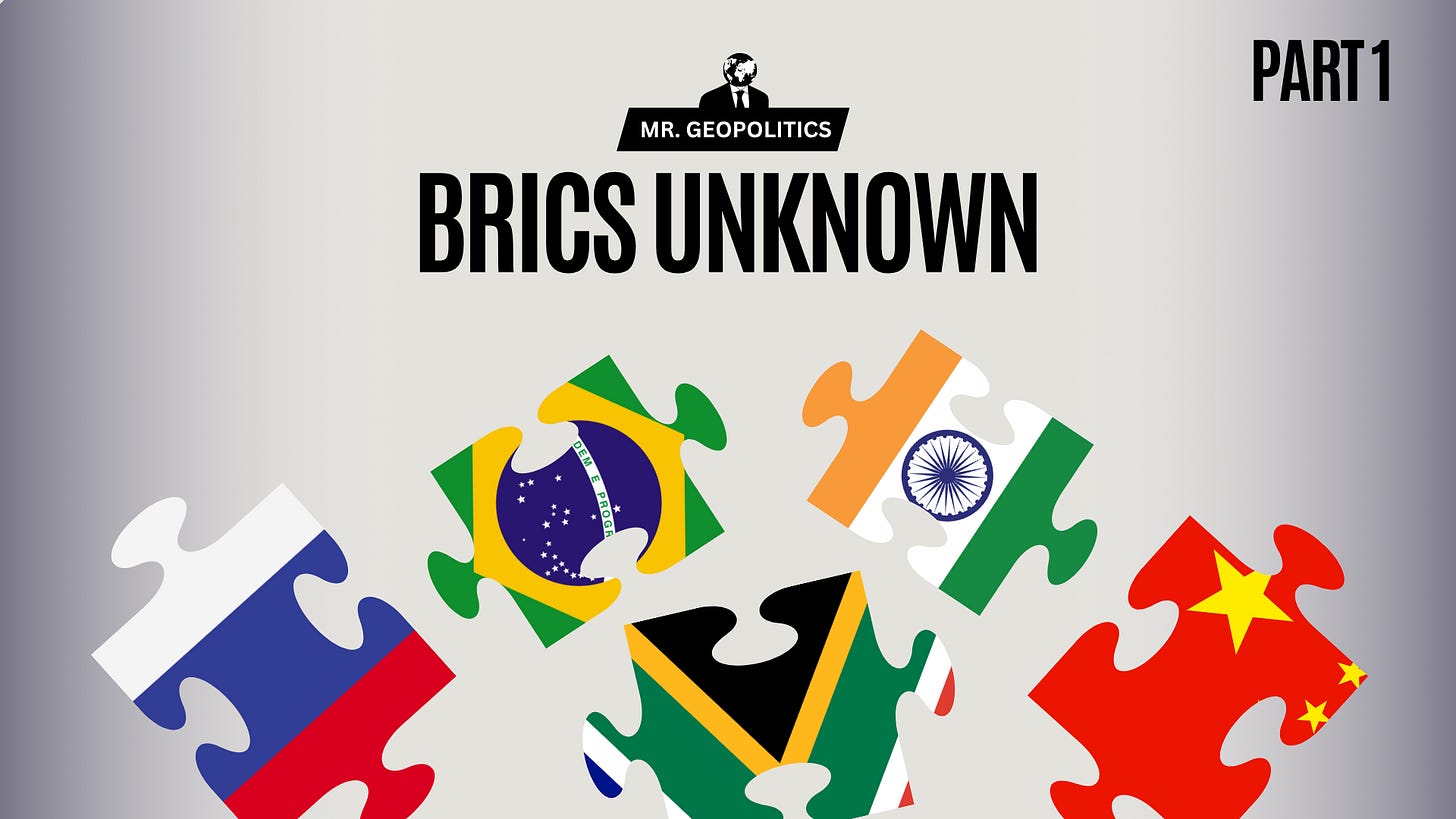BRICS vs. BRICS | Part 1
The future of the world's most infamous bloc
For over a decade, BRICS has been the world’s most infamous bloc.
The predictions and expectations were immense: it would introduce an alternative world order to the West, enable the emerging world (or Global South) to be better represented, and shift the global center of gravity from the Atlantic to Asia and Africa. Nations have lined up to join, including Western powers like France, which sought an invitation to the BRICS gathering in 2023.
📣 POPULAR INSIGHTS ON THIS TOPIC
Last year, at the meeting in Kazan, Russia, BRICS appeared to be at the precipice of a new chapter. The BRICS meet, in the world’s most sanctioned country, had the aura and energy of the G20 years ago. A new “counter collective” had been unveiled. And, even without a BRICS currency or BRICS payment system, the group had immense value and clout as it drove communication between contrasting nations, something that is disappearing in other forums.
A year later, though, BRICS looks shockingly different.
BRICS UNKNOWN
The 17th BRICS Summit in Rio (Brazil) lacked the luster of the previous summit in Kazan (Russia).
This was not just about optics.
The leaders of Russia and China did not attend, a shocking move, particularly for the Chinese leadership. No new nation was added, with the latest addition being Vietnam, which joined as a “partner state” last month. And, besides some expected remarks from BRICS, like criticizing Israel’s strikes on Iran, the most significant comment came from outside the group, when US President Donald Trump threatened 10% tariffs on any economy that “aligned itself” with BRICS projects, which Trump referred to as “anti-American.”
Almost nothing of substance was achieved at the latest BRICS meeting, a wasted opportunity considering the “insecure” state of the world, and the huge desire nations have for solutions and stability. The latest gathering was more akin to the “lameduck” G7 meeting in Canada in June, which Trump left early as the fighting between Tel Aviv and Tehran escalated.
BRICS has indeed entered a new chapter, just not the one it or the world imagined. Now, BRICS is facing off against itself, against its younger version, and the ideas, forecasts, and outlooks that defined it.
It is BRICS vs. BRICS.
This new showdown draws in many dimensions. In some ways, the BRICS faceoff means as much for the West as it does for countries like China, Russia, India, and parts of the Middle East.
SINO-RUSSIAN LOGIC
Overshadowing the BRICS summit in Brazil is the absence of Russian President Vladimir Putin and Chinese President Xi Jinping. The BRICS has three core members - India, Russia, and China - and two did not show up. This is akin to the US and Japan skipping the G7.
The explanations provided by Moscow and Beijing are insufficient. The Chinese said that Xi had “scheduling conflicts.” The Russians said that Brazil’s membership of the International Criminal Court (ICC), which has an active arrest warrant for Putin, was too big a risk.
In reality, however, governments schedule high-level summits like BRICS months in advance, meaning if Xi wanted to attend, he would have. And, Putin has traveled to states that are ICC members, such as Mongolia, thereby rebuffing the arrest warrant.
So, what is actually going on here?
There are two possibilities.
First, Russia and China are locked in a delicate dance with the US. Both Putin and Xi are engaged in negotiations with Trump, ranging from Ukraine to trade, and both leaders are aware of how the US president views BRICS (not favorably). They may have skipped BRICS to avoid rocking the boat too much, a geopolitical calculation aimed at gaining some points with the United States.
Second, Russia and China no longer view BRICS as significant, as they did just a year ago. Both countries are at a pivotal moment in their journeys and need substance and action, not just talk. In their outlook, BRICS may have grown too big too fast, and due to internal frictions, like India-China or Saudi Arabia-Iran, exacerbated by the two wars in the last two months (i.e. India-Pakistan, Israel-Iran), real progress is impossible. The BRICS group has fallen in the priority list as it cannot deploy tangible solutions to the myriad of clear and abstract challenges around the globe.
A mix of the above two possibilities is also on the table.
This casts a new cloud over BRICS, as regardless of the reason that drove Russia and China’s decision not to attend at the head of state level, the result is that BRICS has shifted from being an event and project that was once non-negotiable to something else…
-ABISHUR AKA “MR. GEOPOLITICS”
This is Part 1 of “BRICS vs. BRICS.” Part 2 will be published on July 8 @ 4:30pm EST.
Mr. Geopolitics is the property of Abishur Prakash/The Geopolitical Business, Inc., and is protected under Canadian Copyright Law. This includes, but is not limited to: ideas, perspectives, expressions, concepts, etc. Any use of the insights, including sharing or interpretation, partly or wholly, requires explicit written permission.
Have questions or thoughts? Let’s talk: mrgeopolitics@substack.com.
If you like Mr. Geopolitics, your colleagues might too.
Feel like doing something unique for somebody important?







